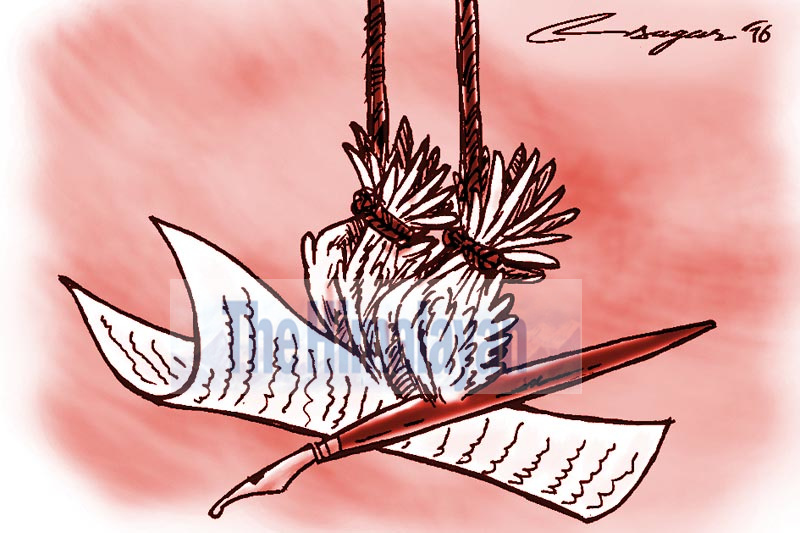Bid to enact restrictive laws opposed
Kathmandu, January 30
The Federation of Nepali Journalists today issued a press release opposing the government and Parliament’s ‘attempt’ to unilaterally enact restrictive laws.
The umbrella body of journalists stated that the parliamentary panel’s decision to propose licensing exam for journalists was objectionable as it was against the spirit of the constitution and press freedom. It said if the controversial provisions of the Media Council Bill were not removed from the bill, it would not accept the Media Council that would be formed after the enactment of the bill.
Media Council should be an independent body which the current bill does not ensure, FNJ added.
It said Media Council should only regulate media without investigating the cases of violation of code of conduct and taking action against violators.
The FNJ said there was a need to enact new laws and amend some laws and bills to fulfil the constitutional purpose but the government must hold adequate consultations with stakeholders before moving any bills in the Parliament.
FNJ added that it repeatedly reminded the government to amend the provisions of the Media Council Bill that contradicted universal norms of press freedom and constitutional provisions.
Legislative Management Committee of the National Assembly had, on January 28, amended some of the clauses of the Media Council Bill.
The FNJ stated that although the House panel removed some of the restrictive provisions of the bill as per its demand, the panel inserted other provisions which the FNJ strongly objected to. The FNJ also wants amendments to the Information Technology Bill to clearly define social networking sites to ensure that the bill’s provisions could not be unfairly used against news portals.
FNJ Chair Govinda Acharya said Section 83 of the bill that criminalised cyber bullying should be removed from the bill as that issue had already been addressed by the new penal code. He said cyber terrorism should be defined as per international law and the IT Bill should be amended to ensure that only a competent court would award punishment in cyber terrorism cases.
The FNJ added that Section 88 of the IT Bill should be amended to remove discretionary powers of the authority who would award punishment to those guilty of crime against sovereignty and public morality as this provision could be unfairly used to curtail freedom of expression.
Acharya added that the IT Bill’s provision that proposed to give powers to government authority to censor posts on social networking sites should be removed from the bill.
He added that the IT Bill’s provision related to defamation and privacy should be removed from the bill as those issues had already been incorporated in the penal code.
He argued that the IT Bill’s proposal to impose fine of up to Rs 1.5 million and jail term up to five years in some cases was too harsh and that should be amended to ensure that punishment provisions are compatible with the punishment proposed in the penal code.






